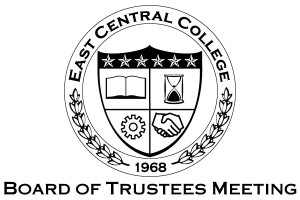Tag Archive: ECC-NEA
ECC NEA Honors Inspiring Local Teachers
May 17, 2022Area High School Teachers Recognized by ECC-NEA
June 21, 2021New Faculty Collective Bargaining Agreement Approved by Board
June 17, 2021East Central College NEA Honors Inspiring Local Teachers
May 7, 2019Nominate a Local Teacher for an “Inspirers of Excellence” Award
March 20, 2018Budget, NEA Agreement and Leases Approved by Trustees
June 17, 2015East Central College trustees approved an $18.3 million general operating budget for the new fiscal year that begins July 1. That represents a decrease of 2.84 percent in the general fund over the 2015 budget.
In presenting the budget to board members at their June 15 meeting, Phil Pena, vice president of finance and administration, noted that the development of the budget for fiscal year 2016 required balancing the needs of students and the community versus revenue growth.
The college derives over 98 percent of its revenue from three sources: tuition and fees, state aid, and local tax revenue. “In putting together this budget we assume an increase in state aid, but little to no growth in local tax revenues and tuition and fee revenue to be down,” Pena stated. “In addition, enrollment trends indicate no growth for the coming academic year.”
Tuition and fees account for 34 percent of the total budget.
Most students at East Central College will not see a tuition increase for the coming year following the implementation of a two-tier tuition model approved by trustees in April. Students in four career-technical programs at East Central College will pay more tuition this fall, due to the higher cost of operating those programs.
Tier 1 is the same tuition structure currently in place: $76 per credit hour for in-district students; $111 per credit hour for out-of-district students; $168 per credit hour for out-of-state students; and $181 per credit hour for international students.
Tier 2 is a higher tuition for precision machining, industrial engineering technology, nursing and culinary arts classes. Tier 2 courses will cost $95 per credit hour for in-district students and $139 per credit hour for out-of-district students. Out-of-state students will pay $210 per credit hour with the rate for international students set at $226. The tier 2 tuition only applies to classes in the programs; students would still pay the base, or Tier 1, rate for general education courses.
Pena noted that despite the additional money generated from tuition for the higher tier classes, a projected four percent drop in enrollment will limit the amount of new revenue available in the general fund.
State aid accounts for 30.2 percent of the total operating revenue for ECC. Pena stated that the 2016 budget projects a three percent increase in state aid. This year state aid accounted for more than 28 percent of ECC’s total operating revenues.
Little or no growth is planned for local tax revenue. The 2015 assessed valuation increased 3.1 percent over 2014, keeping the rate ceiling at the maximum authorized levy of $0.37. Local revenue represents the largest source of revenue for the college at 34.4 percent which is up slightly from the current fiscal year.
The college has 200 full-time employees. All of them will receive a 2.75 percent salary increase.
For the fourth consecutive year the state retirement system will not raise the mandatory contribution rate. Contribution rates still stand at 14.5 percent for faculty and salaried staff and 6.86 percent for support staff.
Salaries and benefits account for the largest share of expenses for the college, totaling 76 percent of general fund spending in the upcoming fiscal year. The 2016 budget also projects utility costs to increase 2.8 percent and a five percent hike in medical insurance costs.
In addition to the general operating fund, the college has four other funds necessary for college operations which brings the total working budget to $39 million. The college restricted programs fund has expected revenue of over $1.3 million for next fiscal year. It contains money from credit hour fees that are used exclusively for the purpose for which they were generated. Another fund is used exclusively to retire the college’s long-term debt and the revenues generated from local property tax collection and is set at $1.5 million. The auxiliary services fund supports college operations such as the cafeteria and bookstore and projects more than $2.4 million in revenue for the upcoming year. Government restricted programs which include students grants and loans total over $15.3 million for fiscal year 2016.







